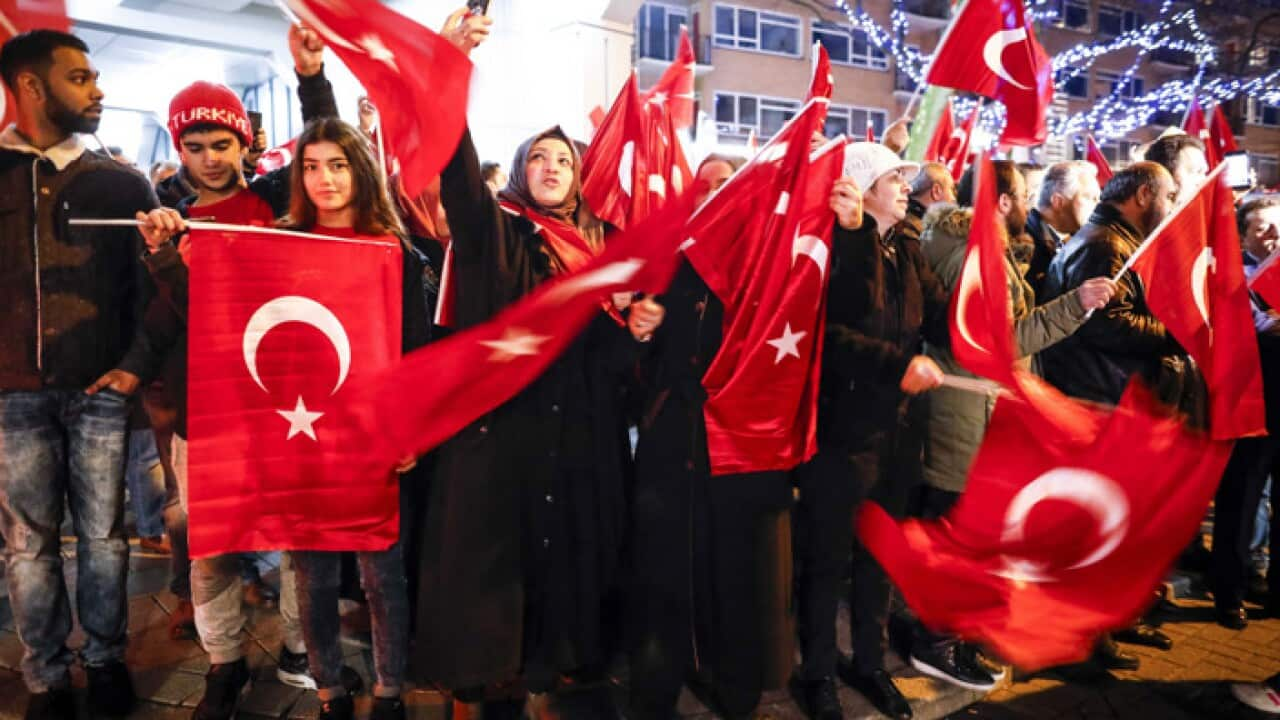His comments came after the Netherlands said it would refuse Foreign Minister Mevlut Cavusoglu permission to land for a rally to gather support for a referendum on boosting Erdogan's powers.
The Dutch decision to ban Cavusoglu from visiting and holding a rally in the port city of Rotterdam came after Germany and other European nations also blocked similar campaign events.
Unlike in Germany, where a string of planned rallies were barred by local authorities, in the Netherlands it was the government that stepped in to block Cavusoglu's visit.
"They are the vestiges of the Nazis, they are fascists," Erdogan told an Istanbul rally Saturday, days after he angrily compared moves to block rallies in Germany to "Nazi practices".
READ MORE

Who's who in Dutch politics
"Ban our foreign minister from flying however much you like, but from now on let's see how your flights will land in Turkey," Erdogan said.
Around 1,000 people waving Turkish flags protested outside the consulate in the Dutch port city of Rotterdam on Saturday evening, watched by a large police presence.
Turkey's Family Minister Fatma Betul Sayan Kaya appeared at the scene after reportedly travelling overland from Germany, but Turkish TV said she was stopped by Dutch police some 30 metres (yards) short of the consulate.
"We've been here for about four hours. We were not even offered water," she told the NTV television channel. "(Dutch) police are not allowing me to enter the consulate. "
"I was told to leave the country and return to Germany as soon as possible," she added. "I will not leave unless I am allowed to meet even for five minutes with our citizens."
The Dutch public broadcaster NOS said police were planning to escort Kaya back to the border with Germany. Police would not confirm anything to AFP.
Cavusoglu flies to France
Cavusoglu flew to France where he is expected to address a rally Sunday in the eastern city of Metz. A French official said the visit had been cleared by the foreign ministry in Paris.
As the row raged, Turkish foreign ministry sources said the Dutch embassy in Ankara and consulate in Istanbul had both been sealed off for "security reasons".
Dutch Prime Minister Mark Rutte said Erdogan's criticism was "crazy."
"I understand that they are angry but this is way out of line," he said. "I really think we made the right decision here."
Cavusoglu, speaking in Istanbul, said the ban was "unacceptable".
"Why are you taking sides in the referendum?" he said, adding: "Is the foreign minister of Turkey a terrorist?"
The Turkish foreign ministry said the Dutch charge d'affaires in Ankara was summoned and told that Turkey did not want the Dutch ambassador -- currently on holiday -- to return "for a while".
The Netherlands is home to some 400,000 people of Turkish origin, and Ankara is keen to harness votes of the diaspora in Europe ahead of the April 16 referendum on creating an executive presidency.
The Turkish government argues the changes would ensure stability and create more efficient governance but opponents say it would lead to one-man rule and further inflame tensions in its diverse society.
Backlash threat
Erdogan accused the Netherlands of working against the "Yes" campaign and said: "Pressure however much you like. Abet terrorists in your country however much you like.
"It will backlash, and there's no doubt that we'll start retaliating after April 16... We are patient. Whoever is patient will reach victory."
Dutch far-right anti-Islam MP Geert Wilders celebrated the government's ban, attributing it to "heavy PVV pressure", in a reference to his party, which appears set to emerge as one of the largest in elections to the Dutch parliament on Wednesday.
The latest row came after NATO allies Turkey and Germany sparred over the cancellation of a series of referendum campaign events there.
Germany is home to 1.4 million people eligible to vote in Turkey -- the fourth-largest electoral base after Istanbul, Ankara and Izmir.
Although Berlin insisted that the string of cancellations by local authorities were down to logistical reasons, Turkish officials repeatedly hit back, leading to Erdogan's angry "Nazi" remark.
German Chancellor Angela Merkel said such rhetoric was "depressing", belittled Holocaust victims and was "so out of place as to be unworthy of serious comment".
Berlin has emerged as a strident critic of Ankara's crackdown after an attempted coup last July, which has seen more than 100,000 people arrested, suspended from their jobs or sacked for alleged links to the plotters or to Kurdish militants.











